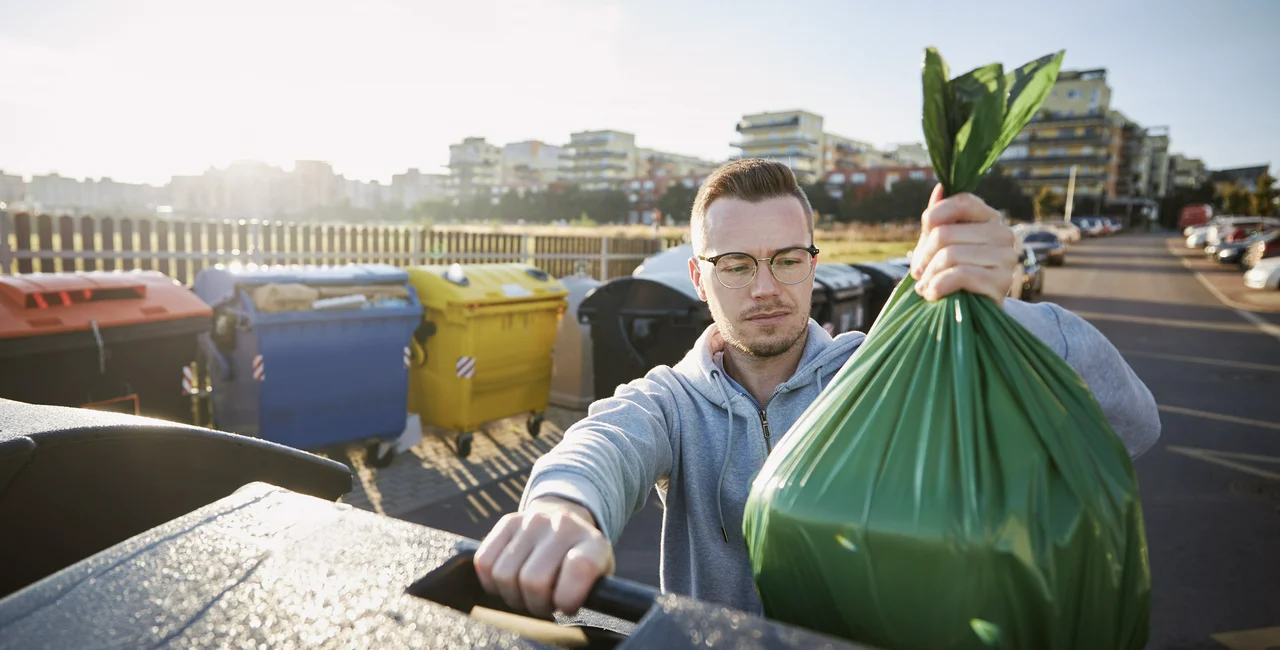Landfilling is still the most-used method of waste disposal in Czechia despite billions of crowns in EU subsidies meant to limit the practice, according to a Supreme Audit Office (NKÚ) report. At the same time, the amount of waste that people generate continues to increase.
While national efforts seem to be failing, Prague’s administration is trying to increase the amount of recycling done in the city with a new ad campaign.
Dumping waste in a landfill is the least desirable way of getting rid of it, according to both Czech and EU environmental policies.
The NKÚ looked into the spending of CZK 9 billion in European Union subsidies earmarked for the environment and also CZK 600 million in state subsidies between 2018 and 2020. The spending did not help to increase recycling capacity. It also didn’t help to modernize or build facilities for energy recovery from waste.
In 2020, some 48 percent of municipal waste ended up in landfills in the Czech Republic, 39 percent of waste was reused or recycled, and 13 percent of the waste was converted into energy.
Environmental policies though, place efforts at waste prevention first, followed by reuse and recycling. Below that is the conversion into energy. Sending waste to the landfill is in last place.
According to the NKÚ, a key issue hindering progress is that a ban on landfilling that was supposed to take effect in 2024 has been postponed to 2030. The landfill fee remained unchanged at CZK 500 per metric ton of waste for 12 years. It only increased to CZK 800 in 2021 – but an exception in the law allows municipalities to landfill a substantial part of their waste at the original rate until 2029.
This makes landfilling more financially more attractive than other forms of waste management. For comparison, it cost an average of CZK 1,799 to convert one ton of waste into energy.
The Czech Environment Ministry does not expect landfilling to reach a price similar to that of energy conversion until 2028, just two years before the landfill ban takes effect.
Rather than being reduced, between 2016 and ’20 the capacity of landfills intended mainly for municipal waste in the Czech Republic increased by 17 percent.
Inspectors pointed out that despite the EU subsidies intended for waste prevention or management, the state has failed to significantly increase waste recycling capacities or to build or modernize existing waste-to-energy facilities. The NKÚ states it is unlikely the Czech Republic will reach the stated target values for recycling or energy conversion.
The Czech Republic was also supposed to pass laws limiting the use of disposable plastic products by mid-2021 at the latest, in line with EU directives. The legislation has yet to be adopted, but a bill is pending in parliament. If it passes both houses and is signed into law, it would take effect in July 2023 at the earliest.
The situation in Prague is a bit different than in the rest of the country. The city has passed its own law in 2019 limiting some single-use plastics at city-sponsored events.
According to Prague City Hall, only a negligible amount of municipal mixed waste ends up in landfills. The vast majority of it is incinerated in Malešice and turned into energy.
The issue facing Prague is that most of the waste that ends up in mixed-waste bins does not belong in them. Plastics, paper, glass, metal, and organic waste make up 68 percent of mixed municipal waste in Prague, and end up unnecessarily at the incinerator. Only 32 percent of the waste in mixed-waste bins actually belongs there.
Many people think that the waste they put in black bins gets sorted eventually, but that is not the case anymore. Most of the bin contents go to the Malešice incinerator and are burned without any sorting. Only a negligible amount of Prague waste that the incinerator cannot accept due to capacity ends up in a landfill.
Prague has begun distributing a leaflet to city residents giving a basic overview of what waste goes where, and useful links to websites with more detailed information. The campaign also points out that the best waste is that which isn’t generated at all.
Proper sorting of waste will also save people money, as there is no fee for recycled waste while the city charges to pick up mixed waste.
The city recommends pressing, tearing, and breaking waste to reduce volume before putting it in collection containers. The containers then hold more waste, so collection is more economical. It is also important to put only the waste that really belongs in the collection containers. Waste is then processed better and valuable raw materials are not degraded by impurities.
PRESS RELEASE FROM CITY:
Most of the waste that ends up in Prague's black bins does not belong there and deserves a second chance. Plastics, paper, glass, metal, but also organic waste make up 68% of mixed municipal waste in Prague and end up needlessly in the incinerator in Malešice (ZEVO). The capital has therefore prepared an information campaign, in the framework of which all residents of Prague will receive information on improving the quality of sorting in their mailboxes in the coming days.
According to analyzes from 2021, almost 30% of the contents of black containers are usable components, namely paper, plastic and glass. Another large group, almost 38%, is biowaste, and the remaining 32% of waste actually belongs here. From the beginning of 2022, the amount of the black bin fee that Prague residents pay depends on its size and collection frequency. In short, it can therefore be said that the more Prague residents sort, the less they pay for their black bin. The capital thus offers its residents many services free of charge with the possibility of sorting waste in the best and most convenient way. In particular, these are:
More information is available on the website:
portalzp.praha.eu/jnp/cz/odpady/index.html
bioodpad.praha.eu/
reuse.praha.eu/
ksnko.praha.eu/map-separated/












 Reading time: 4 minutes
Reading time: 4 minutes 



























